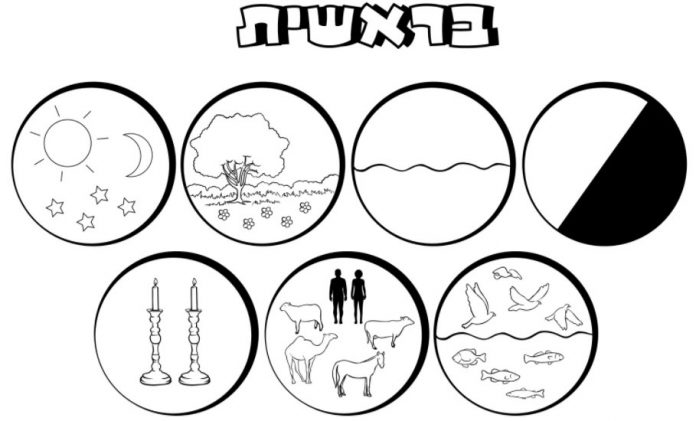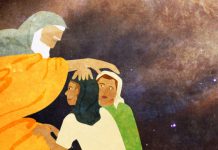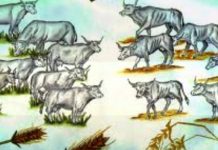Creation of the World, and Adventures of the First Humans
Dateline: December 1968
From his window he could watch the blue orb of planet earth getting smaller and smaller. Looming in front of him in all its detail was a giant moon. Astronaut Frank Borman of Apollo 8 was filled with emotion, as he drew closer and closer to the fulfillment of one of man’s greatest dreams of landing on the moon. As the lunar module orbited, the crew could perceive the moon in its pristine state, untouched by human hands, exactly as it left the hands of its Creator. (One could imagine Adam opening his eyes for the first time and viewing a pristine Earth with the same awe.)
Borman wanted to convey this feeling to everyone glued to their TVs and radios, just so they could in some sense share the experience of this milestone in history. What text could express this feeling? What human poet or author could capture in words that awesome feeling of the smallness of man and the vastness of the universe? Only God’s Torah!
To the ears of billions of earthlings, Borman declared, “In the beginning God created the Heaven and the Earth!” The first chapter of Genesis was read on that historical day to all mankind. (In contrast to the Cosmonauts who orbited the Earth in Sputnik and proclaimed, “We went to Heaven and didn’t find God!”) This is the beginning of the story of man and his world.
“IN THE BEGINNING” – INTRODUCTION TO THE TORAH
Question: What sort of a book is the Torah? Is it a history book? A storybook? A law book? All of the above? Is it a history book that contains laws, or a law book that contains history?
Answer: From a secular perspective, the Torah is basically a history book, which contains some inspiring Bible stories. The secular world appreciates that the Torah is a very “truthful” book, meaning that one can learn many good things from it. Just don’t take it too seriously – as in absolute truth!
From a religious perspective, the Torah is a law book from God with instructions for living. The history (often not in chronological order and containing many gaps) provides background information of the laws. Judaism has an oral tradition that fills in many gaps in the story. We therefore must ask what every story and every detail of every story is coming to teach us! (Rabbi David Gottlieb)
Judaism believes that the Bible is a Divine book. Just as a human author generally writes about topics that interest him, we can similarly assume that the Divine Author of the Torah writes about things that interest Him. Here’s a bird’s eye view of the opening chapters of the Torah:
(1) “In the beginning God created Heaven and Earth” (Genesis 1:1). What a contrast between the vast endless heaven containing countless stars, and one tiny speck in the universe called Planet Earth! Yet the following verse begins, “And the Earth was…” and the rest of the book focuses on Earth. Conclusion: God is interested in Earth!
(2) The six days of creation are described in detail. The trees and grass, the animals, fish, birds, and insects. Then was created one human. What a contrast between the vast expanse of planet Earth, and one individual person! Yet from this point on, the Torah focuses exclusively on humans (and NOT on the trees or insects). Conclusion: God is interested in humanity!
(3) After expounding upon the first human, the Torah lists 10 generations with no events recorded. These generations evidently did not interest the author and are only included for the purpose of chronology. Finally we find the passage, “and Noah was a righteous man” (Genesis 6:9), followed by an entire section concerning Noah. Conclusion: God is interested in “righteous people”!
(4) This is followed again by a list of names for chronological purposes. Another 10 generations go by, until we come to Abraham our Father. Abraham is 75 years old at the time the Torah speaks of him (more details of his youth are found in the oral tradition). From this point on, the Torah records exclusively the story of Abraham’s life and then that of his descendants – right up until the emergence of the Jewish people. The rest of the Torah recounts God’s relationship with the Jewish people. Conclusion: God is interested in the Jewish people who undertake a unique mission, to be a “light unto the nations,” to teach the world about spirituality and our Creator. (Rabbi Avigdor Miller)
“LET THERE BE LIGHT” (GENESIS 1:3)
Rashi explains that the intention of the Torah was not necessarily to present events in chronological order. (For example, the creation of water, among other things, is not mentioned at all.) Rather the meaning is, “In the beginning of the creation of Heaven and Earth, God said let there be light.” When the Sages were ordered to translate the Bible into Greek for the Egyptian king Ptolemy (known as the Septuagint) they changed the opening verse to read “God created in the beginning,” shifting the emphasis to the actual creation. To the believer it is obvious that the world was created.
A Small Analogy: Let’s say the first man on the moon finds a box of Kellogg’s corn flakes with English letters. He immediately assumes that someone beat him there, rather than looking for theories how the box may have spontaneously randomly evolved. Next he finds a plastic model of a heart, with red dye and a battery causing it to continuously beat. That certainly didn’t “evolve”; he sees the obvious planning and design involved in its manufacture. Finally he comes across a real human heart with muscles and blood. Imagine him saying: “Oh, that’s no problem. It randomly evolved!”
AGE OF THE UNIVERSE
Much has been written about the apparent contradiction between the age of the universe, generally accepted by scientists as 15 billion years, and the Jewish tradition of under 6,000 years.
A simple solution which may dispel much confusion: If one accepts the creation of man conceptually, this assumes that the first person was created as an adult, because an infant or child could never survive on his own. It also assumes that trees in full bloom with luscious fruit were available for that first person to eat. Does this contradict the apparent age of the world? Had a dentist examined Adam’s teeth, he would have assumed him to be 30 years old. Had Adam chopped down a tree, he would have counted the rings and proclaimed the tree 100 years old. Had a scientist performed a carbon-14 test, he would have observed a very old universe because God created it in that advanced form.
Conclusion: Conceptually there is no contradiction between scientific calculations and the belief that God created the Universe in full bloom!
“TREES THAT PRODUCE FRUITS” (GENESIS 1:11)
Fruit trees are an observable example of God’s design in creation. Notice that the inside of the orange peel is white, because only the exterior needs to be a colorful orange color to attract people. Is the tree aware of human eyesight?! Unripe oranges are green, blend in with the leaves and cling tightly to the tree. Then when they ripen, they turn bright colors (“Eat me”) and detach easily. When they rot on the ground they turn brown and blend in with the terrain.
Imagine a product in the supermarket with a special wrapper, color-designed to announce the state of the contents, and also containing a free coupon for a new one when you finish one!
Similarly, the watermelon is bright red where it is good to eat, and white where it is not healthy. The watermelon seeds are protected by slippery mucus, which shoots them all over when trying to eat them – to facilitate the propagation of more watermelons. The apple has a plastic-like core that protects its seeds, and, the hardest part of a peach tree is its pit. As the saying goes: The watch proclaims the watchmaker, and the universe proclaims the Creator! (Rabbi Avigdor Miller)
“LET US MAKE MAN” (GENESIS 1:26)
Rabbi S.R. Hirsch explains the use of the plural “let us” as the “Plurus Majestic” like a king who speaks in the name of his kingdom. (The Christians cite this as a source for the Trinity.) Judaism explains that God consulted with the angels in order to teach us to consult with subordinates, and not to make all decisions on our own. Of course, the Torah always provides a built-in guard against misinterpretation, and the next verse describes – in the singular form – how God created man.
“IN HIS IMAGE” (GENESIS 1:27)
This means that people have the capability to be God-like and not animal-like. We have free will, although it is limited – as opposed to the unlimited free will of God.
The judge who recently convicted a teenager of rape, assault and murder, and then later on freed him because he “comes from a broken home,” has denied the free will of the boy, as if to say all people from broken homes must necessarily be potential rapists and murderers! Man has “choice” because, intellectually, he is capable of perceiving spirituality, as opposed to animals who are exclusively physical in nature, and angels who are totally spiritual and as such, act with a clarity that excludes them from tests of free will.
“THE SIXTH DAY” (GENESIS 1:31)
Question: Why doesn’t it just say “day number six” (without “the”), like the other days?
Answer: The Talmud sees here a reference to the 6th day of Sivan, the holiday of Shavuot, the day of the giving of the Torah at Mount Sinai. The message from our verse is that only if the Jews accept the Torah on “the sixth day” of Sivan, will there be a world worthy of spiritual meaning. There is no intrinsic meaning to a purely physical existence.
“THE TREE OF KNOWLEDGE” (GENESIS 2:17)
The first negative commandment to mankind (the first positive command is “be fruitful and multiply” – Genesis 1:28) is surprisingly a dietary law. (“Why is God concerned over what I put in my stomach?”)
When the serpent, a manifestation of evil in its external form, tried to seduce Eve, she replied that we are “forbidden to eat from that tree or even touch it.” Since she was not created at the time of the prohibition, she obviously heard from Adam that it was forbidden to do so.
This is the first example of the transmission of an oral law. We can assume that when Adam told her not to “touch” the tree, he was enacting a rabbinical stringency in order to avoid coming to the transgression that God had commanded not to “eat” from the tree. Unfortunately, by not differentiating between the pure prohibition and the rabbinical fence, Adam made a mistake. The serpent pushed Eve and she touched the tree. “See, nothing happened, you can eat from it, too.” (Rashi) Thus we find, right in the beginning of the Torah, a dietary law, an oral tradition and a rabbinical decree.
Question: What’s wrong with “the knowledge of good and evil” that it should be harmful to pursue it?
Answer: Good and evil are potentially subjective: e.g., “Was it a good meal, or not?” Before the sin, Adam would make decisions based on the objective criteria of true and false. Something can be objectively true but subjectively bad. E.g., The smoker, upon reading that smoking is dangerous to his health, decided to give up reading!
THE FIRST WOMAN
Question: Why wasn’t man initially created male and female like all the other animals?
Answer: God wanted Adam to experience being alone and observing all the animals and their mates, so that he would appreciate his wife more. Much the same way that couples who marry at a later age or have children after many difficulties, tend to appreciate them even more. (heard from Rebbetzin Tziporah Heller)
Question: Why was Eve formed from Adam’s rib? (“How much does she cost? An arm and a leg! What can you get for a rib?”)
Answer: The Sages say it was in order that she could be near his heart and he should love her!
THE WISDOM OF ADAM
Adam gave names to everything. He was created as an intelligent being, one who could communicate (in Hebrew) and understand the essence of all living creatures as alluded to in their names (in classical Hebrew). Judaism doesn’t believe in the “cave man” myth. (While people may have lived in caves, they still had culture!)
The purpose of a spouse is to be an “opposite helper” (Genesis 2:18), meaning they should correct each other when necessary, and assist each other. (Behind every great person is a great spouse!) Together they accomplish what God wants done in His world.
THE SIN OF ADAM
The serpent was originally very human-like. He stood erect and could communicate with people. He was supposed to be “man’s best friend,” yet he embodied the evil temptation to test man.
The Torah describes man as “naked,” because internally he had no concept of evil and had no need to conceal any body parts. Only after the sin, when the concept of good and bad became internalized, did it dawn upon Adam and Eve that they shouldn’t arouse physical desire unnecessarily, so from then on they put on clothes.
The serpent desired Eve, and plotted to have her seduce Adam so he would be tempted to eat, and thus be eliminated from the contest. Adam was attracted by the possibilities of overcoming the challenge of evil, but then became an “addict” and was unable to control it. A different form of free will was now established for all generations. (Rabbi Avigdor Miller)
THE FIRST EXCUSE
God asks: “Where are you Adam?” (Genesis 3:9) The all-knowing God was opening the conversation for Adam to admit his guilt. “How far have you fallen? Henceforth you are mortal.”
Adam denies God’s knowledge and attempts to fool Him. Here we find the first excuse in history. “The woman who You gave me caused me to sin.” (Genesis 3:12) This is Adam’s ungratefulness.
Eve, in turn, continues to “pass the buck.” The second excuse in history: “It’s the serpent’s fault!”
The serpent doesn’t even get a hearing, like all seducers to idolatry (see Parshat Re’eh) and is immediately punished. The rabbis say he could have excused himself by arguing, “Why did they listen to me, when they should have listened to You, God?”
Adam’s punishment was a significant reduction in his free will, as he would now have to spend his time working for a living. The consequence for Eve is that she will experience the pain of childbirth as well as dependence on a husband.
Instead of being man’s best friend, the serpent now becomes man’s worse enemy, and they will constantly be at each other’s vitals.
CAIN AND ABEL (GENESIS 4:1)
When Eve gave birth, man became God’s partner in the creation of life. The Sages say that certain body parts are contributed by the father and some by the mother, and then God injects the soul. When a person dies, God only takes away His part and the rest remains to be buried.
Cain was a farmer and Abel was a shepherd – and there was jealousy between them. Cain conceived of symbolically sacrificing to God. However, he figured, since God isn’t going to eat it anyway, I might as well bring the bad and rotten fruits! Abel observed his brother, but carried it a step further: If we are symbolically proclaiming our gratitude and love for God, we should bring the best of the flock.
The fire came down and consumed Abel’s sacrifice but not Cain’s. This left Cain with very negative feelings. God consoled him and explained how the new serpent (also known as the “evil inclination”) is crouching to pounce on man. But man has the power to overcome it if he so desires.
In spite of the warning, Cain murdered his brother and was banished until one of the 7th generation of his offspring accidentally killed him. Again God attempts conversation so that the person will admit guilt. “Where is your brother?” God asks Cain. And once more, man tries to fool God: “Am I my brother’s keeper?!” (Genesis 4:9)
The Torah says: “The bloods of your brother cry out” (Genesis 4:10).
Question: Why does it say (plural) bloods?
Answer: Cain inflicted many wounds until death occurred. Or else it is referring to the blood of all Abel’s unborn generations who will never see the world.
The Parsha ends with a description of contributions to mankind by the descendents of Cain. They were the first Bedouins (living a nomadic life style), formed musical instruments (culture), and made iron vessels (metallurgy). While they were building up the world materially, spiritually it was rotting away with immorality. God decides to destroy the world, and at this point Noah, who invented the first plow, appears on the scene.
(To be continued next week…)
Shabbat Shalom !
credit to aish.com












